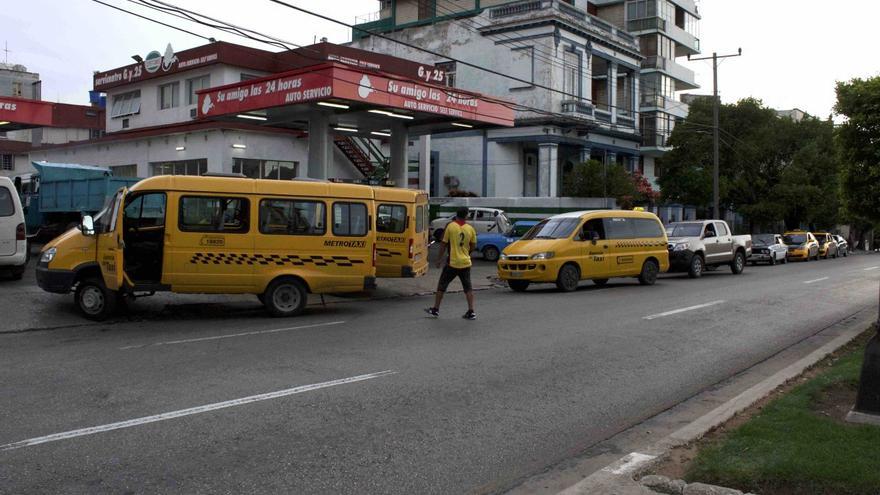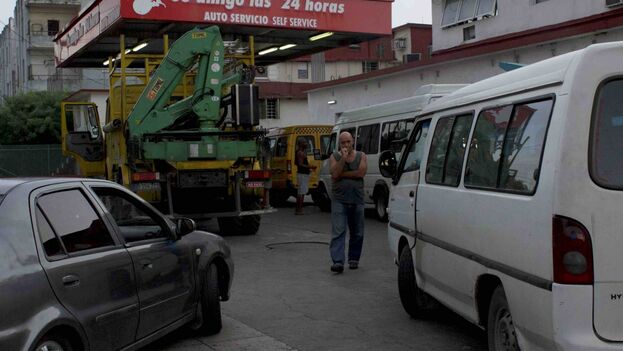
![]() 14ymedio, Luz Escobar, July 18, 2019 — Alexander Barroso had traveled around to several service centers in Havana this Wednesday and the most-repeated response was “there is no gasoline.”
14ymedio, Luz Escobar, July 18, 2019 — Alexander Barroso had traveled around to several service centers in Havana this Wednesday and the most-repeated response was “there is no gasoline.”
“Monday was the last time that I was able to fill the tank at L and 17th and it was sucking up the last bit that remained in the cistern. After that, no matter where I go, it’s ’there’s none, it’s all gone.’ So that’s why I’m in this line,” he tells 14ymedio.
Barroso works as a driver transporting fruit from other provinces to Havana and has come to the gas station on the corner of 25th and G, in El Vedado, via a tip-off from a friend who assured him that it was one of the few places selling fuel to customers. A few hours earlier, the Minister of Energy and Mines, Raúl García, had denied on Cuban television any problem with the fuel supply that would be affecting the energy sector in the wake of the blackouts that the Island had experienced the previous day.
The official version is a failure at one of the power plants, but the lines at service centers confirm that the lack of petroleum is more than real.

The line of taxis, state-owned cars, garbage trucks, private cars, and motorcycles on Wednesday reached from the gas station at which Barroso was waiting to the central Calle 23, some 100 meters.
“The thing is bad but as far as I can see it, it’s going to get a lot worse,” said the driver of a tow truck belonging to the Electric Union of Cuba, positioned in the line. He said that he had been stopped for two days, without being able to work because he hadn’t been able to find petroleum anywhere, and he expressed his lack of hope of being able to fill the tank this week.
The slowness of the line bothered many customers who were complaining about the lack of forward movement. Faced with the fear that the lack of fuel would continue, drivers were filling not only their tanks, but also various receptacles to bring extra gasoline home, despite the fact that selling it in containers is prohibited with the goal, claims the Government, of preventing stockpiling and the diversion of fuel from the state-controlled sector to the private one.
The informal fuel market is widespread in Cuba despite the Government’s efforts to control it by demanding proof of purchase from state and private workers of fuel at service centers. Despite that, many private drivers go to those informal sale networks of gasoline and diesel to cut the costs of keeping their old cars running, which are, as a general rule, gas guzzlers.
“It’s a mess now. Whatever you can grab now, it’s a big fuss. My car has GPS and that’s kilometers traveled against the route sheet, there’s no ’invention’ [i.e. cheating] here,” says the driver of the tow truck after denying the proposal of a botero (taxi driver) who was offering to sell him some of the liters he was allocated by the State through a card.
“I was in a line all morning at a gas station on Fifth Avenue and I didn’t make it,” laments Yantiel, driver of a Peugeot made two decades ago with which he offers trips to the provinces for tourists and local passengers. “It’s disrespectful, because the administrator of the place doesn’t know when gasoline will come again. There’s no information,” he adds.

The drivers of State taxis that drive the route to and from the airport don’t escape the problem, either. “We have to pay the daily lease, which is rather expensive, whether or not we have gasoline,” complained a driver who didn’t want to give his name. “Whether or not I make money I have to pay 35 CUC daily to the State and for two days I haven’t been able to go out to the street because I have no fuel,” he protests.
For Cubans the lack of fuel rekindles the ghost of the return of the Special Period. The crisis of the 90s, after the fall of the Soviet Union, was not only a time of a lack of food and frequent power cuts, but also of grave effects on mobility. The streets filled with bicycles and at bus stops people would wait for hours to get on a bus.
Despite the global fall of the petroleum flow between Cuba and Venezuela, Caracas is still the main energy provider for the Island, which in 2019 so far has received some 53,500 barrels a day of oil from Petróleos de Venezuela (PDVSA). The figure reveals a decrease of 40% if compared with the first half of 2015, according to the company’s data.
On May 10, the US Treasury Department announced sanctions against two companies and two oil companies that, it said, had delivered oil from Venezuela to Cuba since the end of 2018 until March of 2019. PDVSA also reduced its exports to the Island so far this year, according to internal commercial numbers that the Reuters agency had access to, and despite the fact that in May a leak of documents revealed that the delivery in that month had quadrupled that of April.
Just this week, a report published by the newspaper Clarín stated that Maduro’s Government is using pirated boats to continue the delivery of petroleum to Cuba and thus elude Washington’s sanctions. Still, according to that source, PDVSA was sending some 60,000 barrels daily to the Island, against the 100,000 that it was sending before the US measures.
In his recent speech in front of Parliament, Miguel Díaz-Canel assured that there has been a deficit in importation of fuel, which has obligated Cuba to “establish measures of internal restriction for its consumption, avoiding as much as possible effects on the population and on the main productions and services of the economy.”
“I’ll have to put away the car again because I don’t have the nerves to wait in these lines in this heat,” concluded a woman before leaving the line on Calle 25 and G. “This is taking too long. In this time I already would have reached where I’m going on foot.”
Translated by: Sheilagh Herrera
__________________
The 14ymedio team is committed to serious journalism that reflects the reality of deep Cuba. Thank you for joining us on this long road. We invite you to continue supporting us, but this time by becoming a member of 14ymedio. Together we can continue to transform journalism in Cuba.
